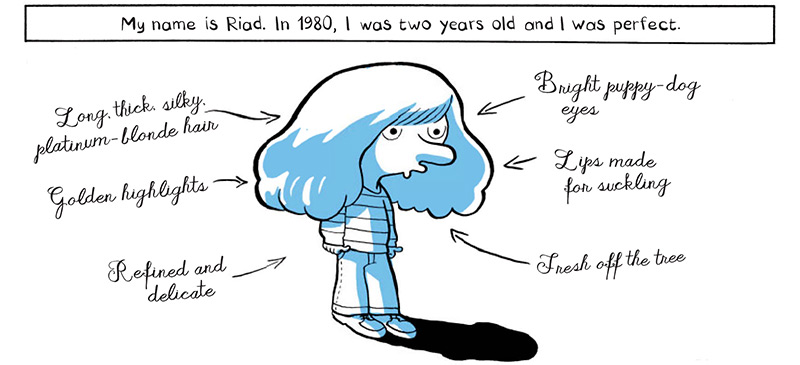

Glacially paced and occasionally scattershot, Riad Sattouf‘s memoir is an interesting read but could have massively benefited from tighter editing. It’s supposed to be a four part series, but could have easily fit into two books like a certain peer’s series about a similar subject.
The market for graphic novels about childhoods in the Middle East isn’t exactly crowded at the moment, so comparisons between Arab of the Future and Persepolis are inevitable. Let’s get that out of the way first- this series thus far doesn’t come close to Marjane Satrapi‘s work. Although there are apparently two volumes to go, it’s fairly unlikely that the next two will suddenly turn things around and become essential reading.

The first few pages of the first book promise something a lot different from Persepolis. They’re lighter in tone; Sattouf is casual and funny and engaging. That light tone continues to pervade the books, particularly due to the clean, Saturday-morning-paper comic style Sattouf draws in. It’s an interesting approach that provides insight into the world of 1970s/1980s Libya and Syria in an accessible manner. A lot of historical background is given in a digestible manner. The location based colour schemes, the additional captions, and the use of smell as a recurring theme are all clever touches as well.
The plot however, gradually gets bogged down with repetitive scenes around the household and pointless subplots that lead nowhere. Sattouf’s could have easily condensed his story down to two books if he’d skipped the story about the time the neighbour’s soon had a plastic cap gun. Or the story about his brief enrollment in a French preschool. Or one of the dozens of stories about his dad lying on the floor acting like an idiot philosopher.

It’s hard to criticize characters in memoirs and autobiographies because you’re essentially judging actual people. Their characters and actions are just being depicted accurately, and if you feel a certain way about them then the author has done a good job of capturing their essence.
So hopefully Riad Sattouf intended for his father to be the most unlikable character in a graphic novel since Wilson, because that’s exactly how he comes off.
A loathsome dork- that’s perhaps the best descriptor for Abdel-Razak Sattouf. A Syrian Redditor-type whose know-it-all attitude is one of the lesser reasons you want to punch him in the face. He’s also: wildly offensive, selfish, rude, childish, oafish, annoying, boastful, prideful, and blindly jingoistic. He starts off innocently enough as a Willy Loman type character, dreaming of the perfect life and the villa he wants to build so badly to prove he’s a big important Syrian doctor. Throughout the two novels he keeps on making bad calls that lead to a hugely unfavourable life for Riad and his long-suffering mother Clementine, as they continue to live in squalor. Let’s hope that the next books feature some sort of comeuppance for the man.

Let’s also hope that they’re a little more tonally even. The lighthearted tone isn’t particularly conducive to telling serious anecdotes, and the random occurrences of intense violence or language are jolting when they’re thrown in so sporadically. Coincidentally, it’s usually during confrontations between Riad and his cousins, most of which could easily be omitted. These instances just don’t merit inclusion, and pad out a narrative that’s simultaneously lengthy and scant on actual plot. The first book covered six years; the second one covers only one. This could easily have been remedied by condensing the memoirs.

It’s not entirely fair to pass judgment on these books right now, as perhaps all these parts will in fact lead up to a payoff in the next two. However those two books could have already been released by now if Sattouf had just skipped the inconsequential stories about the creepy French neighbour who may or may not have been a witch (?)
Final Grade: B